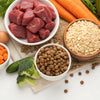How to Put Weight on an Elderly Dog: A Comprehensive Guide for Pet Owners
- Houndsy
Table of Contents
- Introduction
- Understanding the Causes of Weight Loss in Elderly Dogs
- Nutritional Strategies for Weight Gain
- The Role of Exercise and Regular Veterinary Care
- Conclusion
- FAQ
Introduction
Have you noticed your beloved senior dog becoming thinner or less energetic over time? You're not alone. According to recent studies, nearly 60% of pet owners report concerns about their dog's weight as they age. Weight loss in elderly dogs can be alarming, as it often indicates underlying health issues or changes in dietary needs. As responsible pet owners, we want to ensure our furry friends are happy, healthy, and comfortable in their golden years.
In this blog post, we will explore the various factors contributing to weight loss in elderly dogs and practical strategies to help them regain the weight they need. You will learn how to evaluate your dog's health condition, the appropriate dietary changes to consider, and the role of regular veterinary check-ups in maintaining optimal health. By the end of this guide, you will feel empowered to take action and provide the best care for your senior pet.
Throughout this article, we will delve into:
- Understanding the causes of weight loss in elderly dogs.
- Identifying when it's time to intervene.
- Nutritional strategies for weight gain.
- The importance of fresh food and palatability.
- Practical tips for feeding routines.
- The role of exercise and veterinary care in maintaining your dog's health.
Let’s embark on this journey to ensure our senior dogs thrive with the love and attention they deserve.
Understanding the Causes of Weight Loss in Elderly Dogs
As dogs age, their bodies undergo various changes that can affect their weight and overall well-being. Understanding the reasons behind weight loss in elderly dogs is crucial for implementing effective solutions.
Common Causes of Weight Loss
- Reduced Appetite: Senior dogs may experience a decrease in appetite due to dental issues, digestive problems, or simply a change in taste preferences. This can lead to insufficient caloric intake.
- Underlying Health Conditions: Weight loss can be symptomatic of serious health issues such as kidney disease, diabetes, cancer, or hyperthyroidism. If a dog experiences sudden weight loss without any changes to diet or activity level, a vet visit is essential.
- Changes in Metabolism: Just like humans, dogs experience metabolic slowdowns as they age. This can lead to a reduced ability to absorb nutrients from food, contributing to weight loss.
- Muscle Loss: Aging can lead to muscle atrophy, which not only affects mobility but can also make a dog appear thinner. Maintaining muscle mass is critical for a dog's strength and energy levels.
- Behavioral Changes: Senior dogs may also exhibit changes in behavior that affect their eating habits. Stress, anxiety, or depression can lead to decreased interest in food.
When to Be Concerned
So, when should we be concerned about our elderly dog's weight? Generally, if your dog loses more than 10% of their body weight over a few months, it’s critical to consult with a veterinarian. Additionally, observe for other signs, including lethargy, changes in appetite, or behavioral changes, which may warrant further investigation.
Nutritional Strategies for Weight Gain
Once you’ve ruled out any serious health issues with your veterinarian, it’s time to explore nutritional strategies to help your elderly dog regain weight.
1. Assessing Body Condition
Before making any dietary changes, it’s important to assess your dog’s body condition score (BCS). A healthy weight typically means that you should be able to feel your dog's ribs without seeing them prominently. If you can see the ribs clearly, your dog may be underweight.
2. High-Quality Protein Sources
Protein is essential for muscle maintenance, especially in senior dogs. Look for dog foods that list high-quality protein, such as chicken, beef, or fish, as the first ingredient. Fresh, human-grade proteins can also be beneficial.
3. Caloric Density
To help your dog gain weight, consider foods that are calorie-dense. This means they provide more calories in smaller portions, making it easier for your dog to meet their caloric needs without needing to eat large amounts of food.
- High-Fat Content: Incorporate healthy fats like fish oil or chicken fat into their diet. Fat is more calorie-dense than protein and carbohydrates and can help your dog gain weight effectively.
4. Palatable and Fresh Foods
Many senior dogs become picky eaters, which can hinder their weight gain efforts. Fresh foods tend to be more appealing to dogs, increasing their appetite. Consider adding fresh, lightly cooked meats or high-quality canned foods that are easy to chew and digest.
5. Gradual Dietary Changes
When introducing new foods, do so gradually to avoid gastrointestinal upset. Mix a small amount of the new food with the old food, slowly increasing the new food over a week or two.
6. Feeding Frequency
Instead of one or two large meals, consider feeding your senior dog smaller meals throughout the day. This can help stimulate appetite and improve nutrient absorption.
- Example Feeding Schedule: If your dog typically eats twice a day, try dividing their daily portion into four smaller meals. This can help keep their energy levels stable and allow for better digestion.
The Role of Exercise and Regular Veterinary Care
While diet plays a significant role in weight gain, exercise and regular veterinary care are equally important.
1. Gentle Exercise
Maintaining a regular exercise routine can help your dog build muscle mass and improve overall health. Tailor the exercise to your dog's ability, opting for low-impact activities such as leisurely walks or swimming.
- Weight-Bearing Exercises: Encourage your dog to engage in light weight-bearing exercises to promote muscle growth. This could include short walks or gentle playtime sessions.
2. Regular Veterinary Check-Ups
Routine veterinary visits are crucial for monitoring your dog's health as they age. Regular check-ups can help detect any underlying health issues early and allow for timely intervention. Your vet can also provide tailored nutritional advice based on your dog’s health condition.
3. Monitoring Progress
Keep track of your dog's weight and body condition regularly. This can be done through monthly weigh-ins and observing visual changes in their body. If you notice any concerning trends, consult your veterinarian for further guidance.
Conclusion
Addressing weight loss in elderly dogs is a multifaceted approach that requires understanding, patience, and love. By implementing the strategies outlined in this guide—assessing body condition, ensuring a high-quality diet, encouraging gentle exercise, and maintaining regular vet visits—we can help our senior dogs regain weight and improve their overall quality of life.
As we navigate this journey, we invite you to consider how our products can enhance the feeding experience for both you and your dog. Specifically, our Houndsy Kibble Dispenser is designed to make feeding convenient and consistent. Its mid-century modern design not only complements your home decor but also ensures your dog receives perfect portions every time. Explore how the Houndsy Kibble Dispenser can simplify your routine and enhance your dog's feeding experience by visiting Houndsy Kibble Dispenser.
FAQ
1. What should I do if my elderly dog suddenly loses a lot of weight? If your dog experiences sudden weight loss, it's vital to consult a veterinarian to rule out any underlying health issues.
2. Can I give my dog human food to help them gain weight? While some human foods can be beneficial, it’s important to consult with your vet about which foods are safe and appropriate for your dog.
3. How often should I feed my senior dog? Feeding smaller, more frequent meals can help stimulate appetite and improve nutrient absorption.
4. What are some signs of a healthy weight in dogs? A healthy dog should have a visible waist when viewed from above, and you should be able to feel their ribs without seeing them prominently.
5. How can I make my dog’s food more appealing? Consider adding fresh, lightly cooked foods or wet food to your dog's diet to enhance palatability and stimulate their appetite.
By focusing on these aspects of care, we can ensure our elderly dogs continue to thrive and enjoy their golden years with us.












